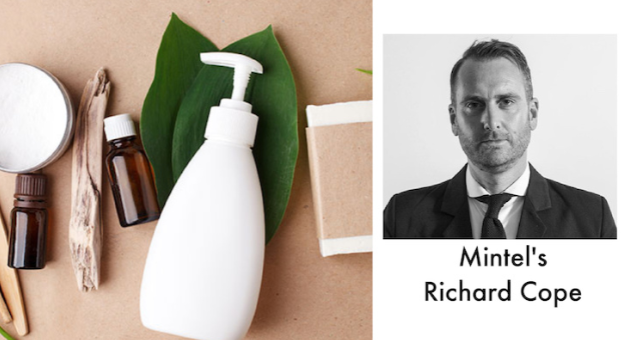
2023-09-08 16:33:07
Mintel Reveals What American Consumers Want in Beauty Packaging
2023-09-08 16:33:07

Richard Cope, Consumer Trends Consultant, Mintel 08.23.23
Analysts at Mintel spent three years working on its Global Outlook on Sustainability report—and it delivers insights on the sustainable attitudes and actions of 40,000 global consumers.
Sustainability is essential, Mintel's research confirms.
In the past three years, consumers’ exposure to extreme weather events and supply line shortages has seen sustainability shift from a “nice to have” premium purchase to an essential issue focused on resilience.
Here are highlights from the report—read on.
Climate Change is a Growing Concern
“Climate change” has grown 9 points to become a top three concern for 40% of Americans, just ahead of “air quality” with 29%.Food and water shortages share joint third place at 31% and their ascent is symptomatic of a population directly impacted—as opposed to emotionally affected—by climate change.
Is Plastic Pollution Less Important?
Although plastic pollution remains a top three concern for 27% of Americans, it is sliding down consumers’ agendas.Eco-activists may have played a role here (36% say they have “raised my awareness of environmental issues”) exemplified by hit documentary Seaspiracy’s dissemination of the revelation that 46% of plastic in the Great Pacific Garbage Patch was actually fishing nets.
We should not devalue the importance of ocean plastic as a rallying call to action—it has arguably been the poster boy/girl for the entire past decade’s upwelling of consumer and media engagement.
But, we should accept that savvier consumers will demand action where the need—or emissions—are greatest.
Greenwashing Is No Longer Acceptable
Consumers won't be fooled by "greenwashing."And—beauty companies asserting their claims toward carbon neutrality should heed the 60% of Americans who say they would prefer for companies to reduce their own carbon emissions rather than use carbon offsetting programs outside of their own area of business.
Beauty brands should work to educate and undo the harm done by some of the limited-edition packaging launches and biodegradable claims that have led consumers to believe that anything is possible.
In our survey, only 35% of U.S. consumers say that they know that recovered ocean plastic’s packaging potential is extremely limited, and even less (33%) say they understand that “most packaging marked as “compostable” can only be composted at an industrial facility rather than at home (e.g, in their garden or backyard).
Consumers Want Clear Labeling
Beauty brands, take note. Before considering whether to purchase a product that claims to be more responsible, what American consumers want to see most of all—at 41%—is labeling that provides a color-coded, 1-5 score of its impact.Here's where to access Mintel's report.
ABOUT THE AUTHOR
Richard Cope is Consumer Trends Consultant, Mintel. He is a graduate of the Cambridge Institute of Sustainability Leadership’s Business Sustainability Management program and a regular public speaker, blogger and podcaster on sustainability issues.
Richard Cope, Consumer Trends Consultant, Mintel 08.23.23
Analysts at Mintel spent three years working on its Global Outlook on Sustainability report—and it delivers insights on the sustainable attitudes and actions of 40,000 global consumers.
Sustainability is essential, Mintel's research confirms.
In the past three years, consumers’ exposure to extreme weather events and supply line shortages has seen sustainability shift from a “nice to have” premium purchase to an essential issue focused on resilience.
Here are highlights from the report—read on.
Climate Change is a Growing Concern
“Climate change” has grown 9 points to become a top three concern for 40% of Americans, just ahead of “air quality” with 29%.Food and water shortages share joint third place at 31% and their ascent is symptomatic of a population directly impacted—as opposed to emotionally affected—by climate change.
Is Plastic Pollution Less Important?
Although plastic pollution remains a top three concern for 27% of Americans, it is sliding down consumers’ agendas.Eco-activists may have played a role here (36% say they have “raised my awareness of environmental issues”) exemplified by hit documentary Seaspiracy’s dissemination of the revelation that 46% of plastic in the Great Pacific Garbage Patch was actually fishing nets.
We should not devalue the importance of ocean plastic as a rallying call to action—it has arguably been the poster boy/girl for the entire past decade’s upwelling of consumer and media engagement.
But, we should accept that savvier consumers will demand action where the need—or emissions—are greatest.
Greenwashing Is No Longer Acceptable
Consumers won't be fooled by "greenwashing."And—beauty companies asserting their claims toward carbon neutrality should heed the 60% of Americans who say they would prefer for companies to reduce their own carbon emissions rather than use carbon offsetting programs outside of their own area of business.
Beauty brands should work to educate and undo the harm done by some of the limited-edition packaging launches and biodegradable claims that have led consumers to believe that anything is possible.
In our survey, only 35% of U.S. consumers say that they know that recovered ocean plastic’s packaging potential is extremely limited, and even less (33%) say they understand that “most packaging marked as “compostable” can only be composted at an industrial facility rather than at home (e.g, in their garden or backyard).
Consumers Want Clear Labeling
Beauty brands, take note. Before considering whether to purchase a product that claims to be more responsible, what American consumers want to see most of all—at 41%—is labeling that provides a color-coded, 1-5 score of its impact.Here's where to access Mintel's report.
ABOUT THE AUTHOR
Richard Cope is Consumer Trends Consultant, Mintel. He is a graduate of the Cambridge Institute of Sustainability Leadership’s Business Sustainability Management program and a regular public speaker, blogger and podcaster on sustainability issues.
LinkedIn




